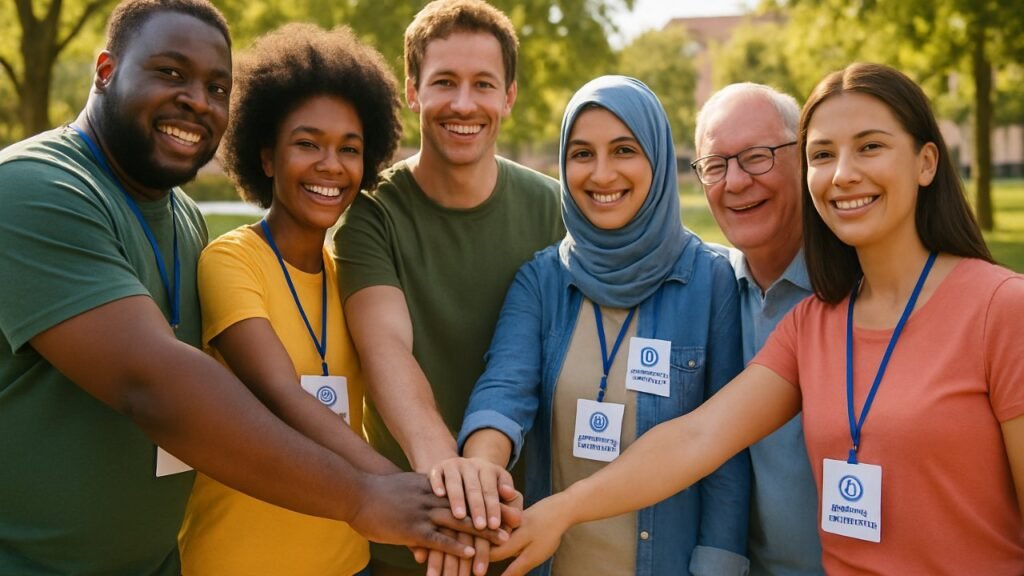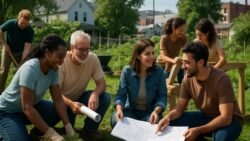UFDP Trains Peace Ambassadors – The Utah Forest Dynamics Plot (UFDP) has become more than just a center for ecological research—it has also evolved into a platform where values of peace, leadership, and unity are instilled within community leaders and peace ambassadors. By using the forest as a living classroom, UFDP highlights lessons of interdependence, resilience, and collaboration that mirror the needs of human societies. In diverse communities where cultural, social, and economic differences may spark misunderstandings, UFDP offers structured programs that bring together local leaders, youth representatives, and volunteers to train them in communication, mediation, and shared responsibility. The philosophy is simple: just as trees thrive in balance with each other, communities flourish when guided by empathy and cooperation. Through practical workshops, mentoring initiatives, and immersive experiences in the natural environment, participants are equipped with the tools to champion dialogue, resolve conflicts, and bridge divides. This holistic approach ensures that UFDP not only safeguards forests but also nurtures the seeds of peace and unity among people.

Training Peace Ambassadors Through Environmental Wisdom
UFDP emphasizes that the qualities of peace ambassadors are best cultivated when rooted in real-life experiences that echo balance and sustainability. The forest ecosystem itself becomes a metaphorical teacher, demonstrating how diversity in species strengthens resilience, just as diversity among people can strengthen societies. Participants in the program undergo interactive sessions where they learn mediation, cross-cultural dialogue, and non-violent communication, drawing direct parallels between ecological harmony and social cohesion. UFDP trainers encourage ambassadors to see conflict as a natural phenomenon—much like ecological disturbances—that can be resolved through adaptive strategies. These sessions are designed not only to impart technical skills but also to instill values of patience, understanding, and respect. By drawing inspiration from the natural processes of growth and regeneration, peace ambassadors leave UFDP with the confidence to apply similar methods of reconciliation and healing within their own communities, ensuring that unity is both sustainable and deeply rooted.
 How UFDP Is Bridging Gaps in Development, Equality, and Social Harmony Through Grassroots Action
How UFDP Is Bridging Gaps in Development, Equality, and Social Harmony Through Grassroots Action
Developing Local Leaders for Inclusive Community Building
One of UFDP’s central missions is to empower local leaders who can guide their communities with foresight, fairness, and inclusivity. The training programs focus on equipping these leaders with skills in negotiation, grassroots organizing, and participatory decision-making. Much like the forest requires interconnected networks of roots for survival, UFDP teaches that strong leadership is not about authority but about building networks of trust and cooperation. Local leaders are guided through simulations that address real-world issues such as resource conflicts, cultural divides, and environmental sustainability challenges. They are also encouraged to foster inclusivity by ensuring marginalized voices—women, youth, and minority groups—are represented in decision-making processes. By combining leadership training with ecological awareness, UFDP helps create leaders who not only manage community affairs effectively but also promote harmony with their surrounding environment. This dual focus ensures that leadership is seen as a shared responsibility, where unity across diversity is nurtured through active participation and equitable policies.
Bridging Cultural Gaps Through Dialogue and Shared Learning
An important dimension of UFDP’s peacebuilding framework is its emphasis on dialogue as a bridge across cultural gaps. Training sessions often bring together participants from different ethnic, religious, or social backgrounds, encouraging them to share personal stories and local traditions. By doing so, the program fosters empathy and reduces the stereotypes that often fuel division. Practical exercises, such as collaborative forest management activities, allow participants to work together toward a common goal, reinforcing the message that collective action transcends individual differences. UFDP facilitators ensure that dialogue is conducted in safe, respectful spaces where every voice matters. This shared learning model mirrors the ecological principle of symbiosis—where different species coexist and thrive by depending on one another. By internalizing these lessons, participants return to their communities better equipped to initiate constructive dialogues, mediate disputes, and create frameworks for peaceful coexistence that honor the richness of diversity.
Sustaining Peace and Unity Beyond Training
UFDP recognizes that true transformation requires continuity, not just one-time training. To ensure sustainability, the program establishes mentorship networks where experienced peace ambassadors and leaders continue guiding new participants even after formal sessions conclude. Alumni of the program often create local councils or community groups dedicated to fostering peace, inspired by the practices they learned. These groups act as ongoing platforms for dialogue, conflict resolution, and joint initiatives—ranging from environmental conservation to cultural festivals that celebrate diversity. UFDP also provides periodic refresher workshops and regional gatherings, ensuring that the values of unity and cooperation remain alive. The ripple effect of this approach can be seen in communities that once struggled with division but now practice inclusive decision-making and shared stewardship. In this way, UFDP demonstrates that peace and unity are not abstract ideals but lived realities that can be cultivated, reinforced, and passed on, much like the enduring cycles of the forest it studies.


